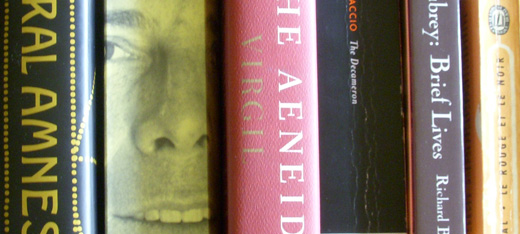Monday Morning Read
¶ In the Decameron, a story worth waiting for: Dioneo, King of the Seventh Day, and clearly a young man who ought not to be allowed entry into respectable homes, is going to tell his tale, which ought to be a corker of marital trickery — ¶but wait! He begins with an apology, claiming that the tale he intended to tell has already been told. If it were anyone else, you just might believe him.
In a very sweet touch, the whole business is prefaced with a remark about the ladies’ “mourning” the “innocent pear tree” that was sacrificed in the previous story.)
In the event, Dioneo’s reputation for bawdiness is not tarnished by this adolescence-accent yarn about a godfather who comes back from the dead to tell his best friend that making it with your godchild’s mother is no big deal — not in Hell, anyway. The surviving friend goes on to profit from this information, although it is to be hoped that, unlike his departed chum, he does not wear himself to death in the process.
And so the Seventh Day of the Decameron comes to a close. I’m beginning to have faith that I’ll have read this book in less than a year!
¶ In the Aeneid, Virgil runs through a key to Tuscan mythologies as the fleet sails to Ascanius’s aid; then Aeneas, shipboard, is awakened by a sea-nymph (formerly a pine tree and then a ship) who exhorts him to prepare to slaughter Rutulians. I can’t help wondering how Classics Illustrated handled this gripping scene.
¶ In Aubrey: Drayton, Saint Dunstan (924-988; “a great chemist”!), Dunstable, Dyer, Egeron. See what you can make of the entry for Sir John Dunstable, which I give entire:
He calls the cellar his library. Parliament men prepare themselves for the business of the nation with all in the morning. Some justices sleep on the bench every assizes.
At Chippenham the Deputy Lieutenants met to see the order of the militia, but there were as many Deputy Lieutenants as officers. After a lengthy sitting (at dinner and drinking after dinner) the drums beat and the soldiers went to march before the window to be seen by tthe Deputy Lieutenant. Sir John Dunstable (colonel) had no marched before them many yards, but down he falls full length in the dirt. His myrmidons, with much effort, heaved him up, and then he cried out, “Some drink, ho!” and so there was an end of that business.
I’m not entirely sure, but I strongly suspect that Dunstable and the others were Cavaliers, and that their behavior explains the Roundheads’ victory in the Civil War.
¶ James Merrill: “The Drowning Poet,” a poem that’s so beautiful I’d like to memorize it, even though it’s all high nonsense to me now. It begins, extraordinarily,
The drowning poet hours before he drowned
Had whirlpool eyes, salt at his wrists, and wore
A watery emphasis.
This is poem for a young person to know well, so as to discover it the course of a life.
Clive James on Peter Altenberg reminds me of a story — my story — about Leon Wieseltier, but that’s not for today. What Altenberg puts James in mind of is men, lust, and love. Here’s a bit of tenderloin:
In Le rouge et le noir, Julien, idling between missions in Strasbourg, falls in with Prince Korasoff (whom he met in London). He also falls for the Prince’s amatory advice (Stendhal is formidably superior about the Russian’s teaching a Frenchman how to love, the point being that Julien is hardly a gentleman by birth and would have to be taught by someone, even a Russian whose manners are per se fifty years behind current fashions), and resolved to “make love” to another woman in order to rekindle Mathilde’s interest. This chapter reads like a very rushed first draft, unrevised.
But there can be no serious doubt, except from those who do not feel it, that the initial attraction of a man towards a woman is felt with the comprehensive force of a revelation. The sentimental view is not the romantic one, but the supposedly realistic one that love follows lust and grows through knowledge. It would be better for all concerned to admit that love hits with full force straight away.
James does quote a great line of Altenberg’s: to a young woman who complained that he desired her only (nur) for sex, he replied, “What’s so nur“? Viennese borscht.

